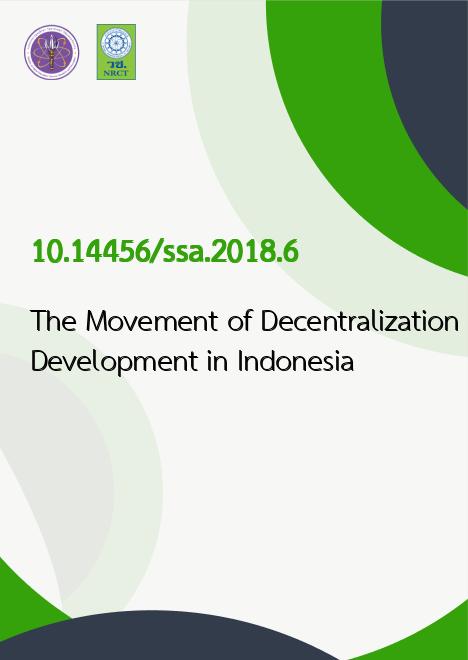
|
The Movement of Decentralization Development in Indonesia |
|---|---|
| รหัสดีโอไอ | |
| Creator | Inthida Chamnongnit |
| Title | The Movement of Decentralization Development in Indonesia |
| Publisher | National Research Council of Thailand |
| Publication Year | 2561 |
| Journal Title | SOCIAL SCIENCE ASIA : Official Journal of National Research Council of Thailand in conjunction with the College of Local Administration Khon Kaen University |
| Journal Vol. | 4 |
| Journal No. | 2 |
| Page no. | 61 |
| Keyword | Decentralization development, movement of decentralization, Indonesia |
| URL Website | http://e-journal.nrct.go.th/ |
| Website title | e-journal |
| ISSN | 2229-2608 |
| Abstract | This article is the study of decentralization in Indonesia after the declaration ofindependence. It aims 1) to examine decentralization development in Indonesia by discussingoverall changes in 4 periods, and 2) to propose lessons to be learnt from decentralization inIndonesia. This study is a documentary research and the findings reveal that in the first periodafter the declaration of independence (1945 1959), there were arguments about the specificdirection that the nation was taking. At the end of this first period, laws about decentralizationwere enacted which would have an effect on the subsequent second period designated asGuided Democracy (1959 1965). The enforcement of the decentralization laws periodicallycaused turmoil and unrest in many areas. Therefore, a state of emergency was declared andadministration was altered from parliamentary democracy to semi-authoritarian rule. A numberof laws were revoked, including the decentralization laws. The central government appointedtheir nominees to administer local government so that all authority was returned to Jakartawhile Java was restored as the centre of power. The third period was named the New Orderperiod ( 1965 1998): orders relating to administration were provided in the same way asbefore and interfered with local government which continued to be controlled by the centralgovernment. Eventually, people started to claim their own rights at the end of this period duringa time of economic crisis. The reform period (1998 present) is the fourth period: followingconflicts between citizens, substantial reform was requested. Meanwhile, some groups wantedIndonesia to change into a federal state. Initially, the administration mechanism ofdecentralization weakened local government especially in terms of budget allocation and localpoliticians could not set up their own parties. However, the regimen was altered fromcentralized to local government. In addition, a number of laws were enacted, includingprovisions for the direct election of people, reduction of the power of dismissing local leaders,degrading the power of local councils, solving financial problems, budget allocation to localareas, and anti-corruption. From the study, there are some observations that the decentralizationlaws and local administration organization of Indonesia were rapidly established through theopinions and brief participation of only a few people. A small group of people were responsiblefor the legal regulations from 1999 to 2004. Interestingly, there were no protests, opposition orchaos and such laws were publicly accepted. Key lessons that can be extracted from this studyinclude: 1) the readiness for and needs of decentralization and local administration, 2) a goodimage to local administration, 3) acceptance of elections and laws, 4) the role of leaders,5) decentralization, and 6) promoting local leaders to become national leaders. |